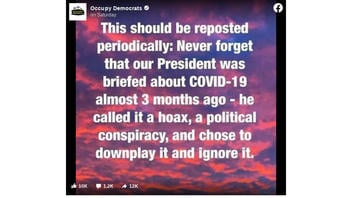
Did President Trump refer to the novel coronavirus as a "hoax" or a "political conspiracy"? No, that's not true: Social media posts making the rounds have taken Trump's comments out of context to suggest he was calling the Coronavirus a hoax or conspiracy. Instead, the president was referring to what he believed were Democratic efforts to politicize the coronavirus.
The claim appeared in a post (archived here) published on Facebook by Occupy Democrats on April 11, 2020, with the following text:
This should be reposted periodically: Never forget that our President was briefed about COVID-19 almost 3 months ago - he called it a hoax, a political conspiracy, and chose to downplay it and ignore it.
This is what the post looked like on Facebook at the time of writing:
The post is misleading because it referred to an oft-repeated assertion that Trump called the coronavirus a hoax, a claim we have previously called out as false. Other fact checkers have also weighed in on the suggestion and come to the same conclusion.
The meme added another detail, maintaining that he called COVID-19 a "political conspiracy." That is also not true. Instead, Trump said that Democrats were politicizing the virus.
Here is a transcript of the February 28, 2020, event that featured Trump's comments. Lead Stories has emphasized the words in bold so readers can see they were taken out of context:
Now the Democrats are politicizing the coronavirus. You know that, right? Coronavirus. They're politicizing it. We did one of the great jobs, you say, "How's President Trump doing?", "Oh, nothing, nothing." They have no clue, they don't have any clue.
They can't even count their votes in Iowa, they can't even count. No, they can't. They can count their votes. One of my people came up to me and said, "Mr. President, they tried to beat you on Russia, Russia, Russia." That didn't work out too well. They couldn't do it. They tried the impeachment hoax. That was on a perfect conversation.
They tried anything, they tried it over and over, they've been doing it since she got in. It's all turning, they lost. It's all turning, think of it, think of it. And this is their new hoax.
Lead Stories searched the entire transcript for the word "conspiracy" and did not find a single occurrence of Trump using that term. We also cannot find any other time he specifically called it a conspiracy.
His comments at the rally did create some confusion, however. The next day, at a news conference, the president said he was talking about the Democrats' criticism of him, not referring to the coronavirus as a hoax:
No, no, no. 'Hoax' referring to the action that they take to try and pin this on somebody, because we've done such a good job. The hoax is on them, not -- I'm not talking about what's happening here; I'm talking what they're doing. That's the hoax. That's just a continuation of the hoax, whether it's the impeachment hoax or the 'Russia, Russia, Russia' hoax.
This is what I'm talking about. Certainly not referring to this. How could anybody refer to this? This is very serious stuff. But the way they refer to it -- because these people have done such an incredible job, and I don't like it when they are criticizing these people. And that's the hoax. That's what I'm talking about.
The post correctly noted that the president was briefed about the possibility of a pandemic almost three months ago. The New York Times reported on April 11, 2020, that he was warned in late January:
Despite Mr. Trump's denial weeks later, he was told at the time about a Jan. 29 memo produced by his trade adviser, Peter Navarro, laying out in striking detail the potential risks of a coronavirus pandemic: as many as half a million deaths and trillions of dollars in economic losses.
Still, the post is wrong to suggest that Trump expressly referred to the coronavirus as a hoax or a political conspiracy. He did not use those words.


















